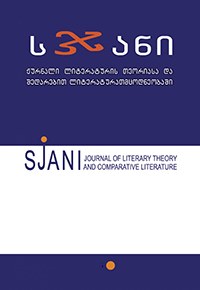რიტმული დანაწევრების ფუნქცია ლექსში
Concerning the Function of Rhythmic Division in Verse
Author(s): Tamar LomidzeSubject(s): Language and Literature Studies, Studies of Literature
Published by: ლიტერატურის ინსტიტუტის გამომცემლობა
Keywords: Rhythmic division; “Pure form” of verse; Mythological consciousness;
Summary/Abstract: This article is an attempt to answer the question: what function does the formal aspect of the verse perform, in particular, its rhythmic division and what is it for, if it is possible to comprehend the “content” of the verse, abstracting from its form, from its rhythmic structure? Poetic (versified) texts are studied one-sidedly; as a rule, literary critics analyze only the content and the figurative system of the poetic text or only formal features of verse - metrics, rhyme, etc. One gets the impression that formal characteristics of verse represent only a certain external factor for the content of the verse. Researchers argue that the form and content of the verse are a single whole, but in fact they differentiate them from each other. This tendency has existed for such a long time (for centuries) that, apparently, is not an accidental phenomenon. Evidently, it is possible to recognize that the formal aspect of poetic texts (as well as their content) are characterized by a certain (although not complete) autonomy. Yu.M. Lotman noted that the initial point for the study of verse is the recognition of its paradoxicality. In our opinion, one of the reasons for this paradox, apparently, is the aforementioned characteristics of verse. M.L. Gasparov argued that we never comprehend only what is said by the meaning of the words - we also always feel what is prompted by the form of the meter, rhythm, rhyme, stanzas
Journal: სჯანი
- Issue Year: 2021
- Issue No: 22
- Page Range: 173-183
- Page Count: 11
- Language: Georgian

